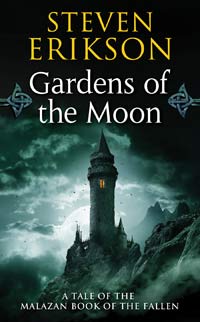So, you waited a few years, finished A Dance with Dragons in three days, and now you’re kicking yourself for rushing through it even as you’re jonesing for something else to get you through the next several years until book seven. How about ten books, plus a handful of novellas, plus a promised new prequel trilogy: think that might tide you over? The series is the Malazan Book of the Fallen, by Steven Erikson, and here are a few reasons why you should pick up book one—Gardens of the Moon.
- The series starts with Gardens of the Moon and ended with The Crippled God this year. Yes, I said, “ended.”
- It opens in the middle of the story. You know who else opened his epic in medias res? Homer. You know how long people have been retelling that story? See my point?
- There are gods. See above.
- It has undead. But not “oh no, some brooding sparkly guy bit me so now I can’t die” undead. No, they made themselves undead on purpose so they could keep fighting an endless war and ensure the utter extinction of their enemy, even if it took thousands of years. Way cooler.
- A story that sweeps across years, continents, and both the mortal and immortal planes involving an empire that has conquered numerous peoples but is now struggling to hold itself together. Gardens focuses on the attempt by an elite Malazan army unit—the Bridgeburners—to take a single city.
- Larger than life characters, including Anomander Rake—the thousands-year-old, shape-shifting, soul-sucking-sword-carrying leader of the non-human Tiste Andii whose home is a flying mountain.
- Characters who are just the size of life. The best characters are not the god-like ones, but the mortals who have to muck around in the day to day without the benefit of immortality. Nobody does the common grunt like Erikson, save perhaps Glen Cook. And nobody has the common grunt tick off the gods quite so much either: “Don’t mess with mortals” is one of the taglines. No “Great Men” version of history here.
- Grey is the new black. Good people do bad things. Bad people do good things. Sometimes what/who we thought was good turns out to be bad and vice versa. Or even vice vice versa.
- A world in flux. Too many fantasies present a static world or a storyline whose goal is a return to the status quo—the return of the king, say. Here, the entire world of Malaz feels like it’s constantly on the cusp of transformation. The empire is tottering, past loyalties are being questioned, old gods are waking up, new gods/ascendants are entering the stage, alliances are broken and formed, enemies and allies exchange places, “extinct” races re-emerge, immortals die, strange new creatures are birthed. Nothing is set in stone, not even death.
- Characters that are actually complex, not the faux complexity that pretends to opaqueness but is eventually, comfortingly explained. True complexity encompasses contradiction and confusion. Like real people, Erikson’s characters change their minds, their personalities, have murky motivations or motivations that remain stubbornly unclear or unrevealed. Most of us, if we were honest, would be hard-pressed to say we truly “know” anyone, or more than a tiny handful of people. Why then should we expect to “fully understand” characters?
- A pervading sense of time. Events from days, months, years, centuries, and thousands of years ago have repercussions that ripple through the present action. Myths, stories, and histories are consequential, whether they turn out to be true or wholly false. Some of those thought long dead rise again. Others who stay dead haunt those who knew them for years. Civilizations, cultures, races, gods, religions, and of course, empires rise and fall leaving behind stories, shards of pottery, strange artifacts, flying mountains, rivers of ice. And Erikson examines what happens when that sense of time is weakened by near or total immortality or by the curse of forgetfulness.
- Big ideas: The influence of story and myth. What it means to be human. The benefits of civilization and whether they outweigh the negatives. How we treat each other and the world around us. Enslavement in all its forms, literal and metaphorical. The impact of individual choice in an indifferent natural universe or within an indifferent or even inimical human one. The power of compassion and empathy. The horror of their absence. Environmentalism. Imperialism. Inequality. Means versus ends. Native culture. The power of religion (or belief in general). How to deal with the recognition that we live in a world where everything is filtered through a limited point of view.
- Technically stimulating or risky: Multiple limited points of view. Non-linear structures. Braided narratives. Unreliable narrators. Wide diversity of voices. Subversion of tropes. Use of simile, metaphor, poetry, echoes of imagery and language, epigraphs, etc. An incredible layering of links and foreshadowings. More than nearly any fantasy work I know, it rewards rereading. It nearly, in fact, demands it.
- Humor (admittedly more in later books than GoTM) in various forms: slapstick, surrealistic, wry, situational, ironic, buddy comedy, puns….
Gardens of the Moon is not without its flaws; but it is a captivating, stimulating read that defies the reader’s preconceptions of fantasy. It challenges as well their tolerance for ambiguity, confusion, complexity, unanswered questions, dislocation, uncertainty, and fluidity. In other words, it challenges their ideas of fantasy by confronting them with reality. It also tells a damn good story about characters we come to care a lot about. You should pick it up and start reading. But I’d recommend you have books 2-10 handy; you’re gonna want them when you’re done.
Bill Capossere writes short stories and essays, plays ultimate frisbee, teaches as an adjunct English instructor at several local colleges, and writes SF/F reviews for fantasyliterature.com.










